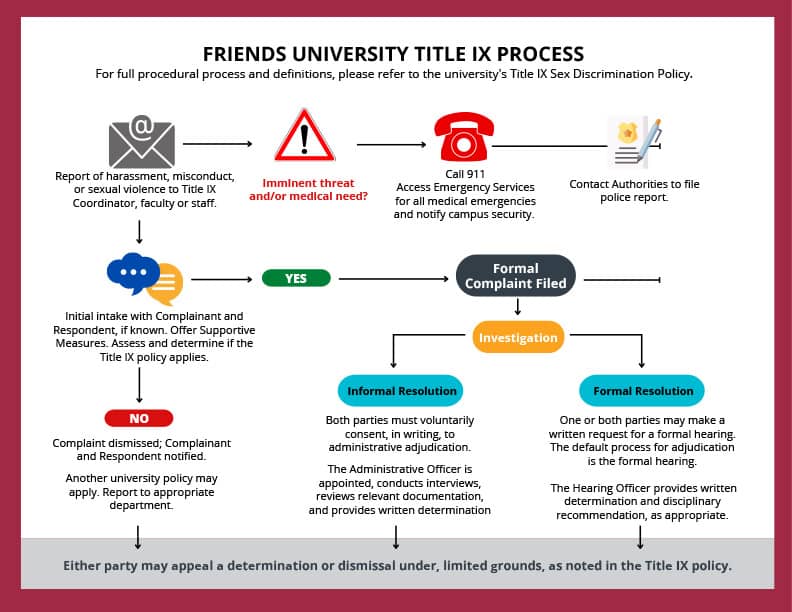Title IX
Contact
Danita Mason – Title IX Coordinator | 316-295-5676 danita_mason@friends.edu
Ken Stoltzfus – Deputy Title IX Coordinator | 316-295-5098 ken_stoltzfus@friends.edu
Title IX of the Education Amendments of 1972 protects people from discrimination based on sex in education programs or activities that receive federal financial assistance. Title IX states that no person in the United States shall, on the basis of sex, be excluded from participation in, be denied the benefits of, or be subjected to discrimination under any education program or activity receiving federal financial assistance.
Friends University affirms its commitment to promote the goals of fairness and equity in all aspects of the educational enterprise.
Friends University adheres to all federal and state civil rights laws prohibiting discrimination in private institutions of higher education. Friends University does not discriminate on the basis of sex, age, race, color, national origin, or disability in its programs and activities generally available to students.
View Friends University’s full discrimination, harassment, sexual misconduct, stalking and retaliation policy.
View Friends University’s accreditation and nondiscriminatory/equal opportunity policy.
View the Clery Act.
Title IX
Training & Development
Below is more information regarding the Title IX training that Friends University faculty and staff complete annually.
Module 1 – An Introduction to Managing Title IX Sexual Harassment on Campus
The Fundamentals of the Law module provides an overview of the new Title IX rule. Starting with a background and history of Title IX, the module details key definitions, elements of a sufficient response to “Title IX sexual harassment,” interim and supportive measures and record-keeping requirements.
Required For: Administrative Officer (Decision-Maker), Advisor, Title IX Coordinator, Deputy Title IX Coordinator(s), Hearing Officer, Investigator, Appeals Officer, Supervisors
Module 2 – Formal Complaints of Title IX
The Formal Complaints module discuss the new regulation’s framework for formal complaints of Title IX sexual harassment. The module details the ten core requirements for a formal complaint process and explains the requirements regarding dismissals and consolidation of complaints.
Required For: Title IX Coordinator, Deputy Title IX Coordinator(s)
Module 3 – Title IX Investigations & Informal Resolutions
The Investigations and Informal Resolutions module explain the new regulation’s requirements for investigations of formal complaints of Title IX sexual harassment. The module explores key concepts, notice requirements, confidentiality, evidence, serving impartially, issues of relevance, interviews, credibility determinations, collection and review of documentation and writing investigative reports. The module also explains the regulation’s requirements regarding informal resolutions.
Required For: Title IX Coordinator, Deputy Title IX Coordinator(s), Investigator
Module 4 – Title IX Hearings
The Hearings module discuss the new regulation’s hearing requirements for formal complaints of Title IX sexual harassment. The module delves into key concepts, the live hearing requirement, advisors, managing cross-examination, relevance, credibility, burden of proof, evidence and legal privileges
Required For: Administrative Officer (Decision-Maker), Advisor, Title IX Coordinator, Deputy Title IX Coordinator(s), Hearing Officer
Module 5 – Title IX Determinations
In the Determinations module explore the new regulation’s requirements for written determinations of responsibility following a hearing. The module covers key concepts, the format and content of determinations, organizing facts and thoughts, excluding facts in evidence, weighing facts under applicable evidentiary standards, types of evidence, effective deliberations and writing a defensible determination.
Required For: Administrative Officer (Decision-Maker), Title IX Coordinator, Deputy Title IX Coordinator(s), Hearing Officer, Appeals Officer
Module 6 – Title IX Appeals
The final module of the series, explains the new Title IX rule’s requirements for appeals. The module details key concepts, bases for appeal, drafting appeal decisions and requirements for appeal officers.
Required For: Advisor, Title IX Coordinator, Deputy Title IX Coordinator(s), Appeals Officer
